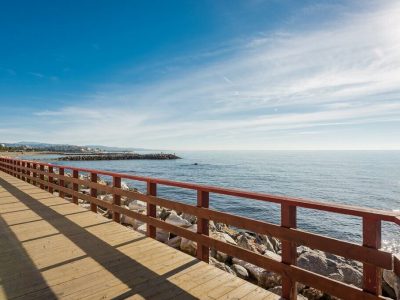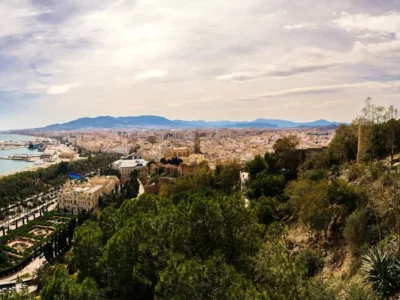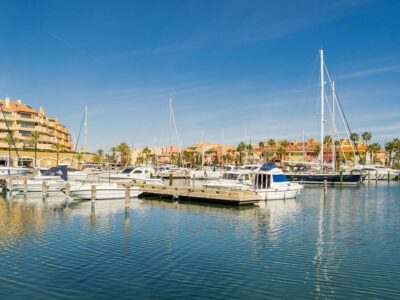
The Costa del Sol stands out for its commitment to sustainability. Turismo Costa del Sol has launched a project to measure and offset the carbon footprint of tourists. Sustainable Life Costa del Sol promotes environmentally friendly practices and the development of eco-friendly housing in the area.
Commitment to Sustainability on the Costa del Sol
The Costa del Sol is distinguished by its commitment to sustainability and eco-friendly living, with initiatives that promote environmentally respectful practices.
Initiatives by Turismo Costa del Sol
- Carbon footprint measurement and compensation project.
- Repopulation of affected natural areas.
Development of eco-friendly and sustainable housing
- Features of sustainable homes.
- Construction duration and costs.
Málaga Viva: Carbon Footprint Compensation
The ‘Málaga Viva’ initiative focuses on compensating the carbon footprint through tree planting and reforestation in the province of Málaga, thus promoting sustainability and the protection of the natural environment.
Tree Planting in the Province of Málaga
Tree planting is one of the key actions of ‘Málaga Viva’, aimed at increasing forest coverage and contributing to CO2 absorption, fostering biodiversity and improving air quality in the region.
Land banks for reforestation
In addition to direct planting, land banks are being created for reforestation in degraded areas, thus recovering natural spaces and promoting the recovery of ecosystems in the province of Málaga.
Promotion of sustainable tourism development in the area
‘Málaga Viva’ not only focuses on carbon footprint compensation but also seeks to boost sustainable tourism development in the area, recognizing the importance of a balance between conserving the natural environment and tourism activity.
Return on Investment in Eco-Friendly Homes
Eco-friendly homes not only contribute to environmental care but also offer economic benefits to their owners. Below are the key aspects related to the return on investment in these types of properties:
Savings on Energy Bills
Eco-friendly homes are designed to be highly efficient in terms of energy consumption. This translates into significant savings on electricity and heating bills, as they typically require less energy to maintain a comfortable indoor temperature. The installation of renewable energy systems, such as solar panels, also contributes to reducing conventional energy expenses.
Property Valuation in the Real Estate Market
Besides savings on operational costs, eco-friendly homes tend to increase their value in the real estate market. The growing demand for sustainable and energy-efficient properties has made these types of homes perceived as an attractive investment. Buyers are increasingly looking for properties that allow them to reduce their environmental impact and long-term expenses, which is reflected in a higher resale value.
Impact of Sustainability on Tourism
Sustainability has become a key indicator of quality in the Costa del Sol’s tourism sector, demonstrating a commitment to the environment and the community.
Recognition of Sustainability as a Quality Indicator
The adoption of sustainable practices not only benefits the environment but also improves the reputation of a tourist destination as being environmentally respectful.
Image of an Environmentally Conscious Tourist Destination
The Costa del Sol stands out as a destination that values the balance between tourism and the preservation of the natural environment, attracting travelers seeking conscious and respectful experiences.
Advantages of Sustainable Accommodation Options
Sustainable accommodation options on the Costa del Sol offer various benefits for both the environment and conscious tourists. Below are the most significant benefits:
Promotion of Environmentally Friendly Practices
- Use of renewable energies to reduce the carbon footprint.
- Implementation of recycling systems and efficient waste management.
- Promotion of local biodiversity conservation through environmental protection initiatives.
Options for Responsible Tourists
- Promotion of environmental education to raise awareness among tourists about the importance of sustainability.
- Facilitation of eco-friendly activities for visitors to actively participate in conserving the environment.
- Creation of tourist experiences that respect the culture and nature of the destination, contributing to its preservation.
Repopulation Projects in the Province of Málaga
The main objective of repopulation projects in the province of Málaga is to contribute to the recovery of affected natural areas, promoting biological diversity and helping to offset the carbon footprint in the region.
Goals of Environmental Initiatives
- Restoring damaged ecosystems
- Promoting the regeneration of degraded areas
- Fostering local biodiversity
Carbon Footprint Compensation in the Region
Tree planting and repopulation of areas affected by fires help absorb CO2, contributing to neutralize the environmental impact and improve air quality in the province of Málaga.
Development of Eco-Friendly Tourism on the Costa del Sol
The Costa del Sol has stood out for its commitment to responsible and eco-friendly tourism, adapting to the current demands of environmentally conscious travelers. Strategies have been implemented to reduce environmental impact and promote sustainable practices in the region.
Adapting to Current Demands for Responsible Tourism
The development of eco-friendly tourism on the Costa del Sol responds to the growing environmental awareness of tourists, who demand sustainable and respectful experiences with the environment. This adaptation is reflected in the offer of services and activities that prioritize the protection of the environment and the conservation of nature.
Strategies to Reduce Environmental Impact
To promote sustainable tourism, various strategies have been implemented on the Costa del Sol. These include promoting eco-friendly transportation, reducing plastic consumption, and raising awareness about the importance of preserving natural resources. Waste management programs have also been established, and the use of renewable energies in the tourism sector is encouraged.
Innovations in Sustainable Housing Construction
The construction of sustainable homes on the Costa del Sol has become a priority, standing out for the use of environmentally friendly materials and eco-friendly design.
Use of Environmentally Friendly Materials
- Priority is given to the use of natural and renewable materials, such as certified wood and cork, which minimize environmental impact during construction and throughout the lifecycle of the house.
- Recycled and recyclable materials are a common choice, promoting the circular economy and reducing waste generation.
- Bioconstruction and bioclimatic architecture are key concepts in material selection, seeking a balance between the natural environment and construction.
Energy Efficiency and Eco-Friendly Design
Sustainable homes on the Costa del Sol incorporate innovations in energy efficiency to reduce resource consumption and minimize carbon emissions.
- Thermal and acoustic insulation systems ensure optimal indoor comfort, reducing the need for heating and cooling.
- The orientation of homes and the design of natural ventilation maximize the use of natural light and fresh air, reducing dependence on artificial lighting and air conditioning.
- The integration of renewable energies, such as solar panels and rainwater harvesting systems, contributes to energy self-sufficiency and sustainable resource management.
Carbon Footprint Compensation in Pilot Project
As part of the sustainability initiative on the Costa del Sol, a pilot project for carbon footprint compensation has been implemented, focused on the repopulation of natural areas affected by forest fires. This project aims to mitigate the environmental impact generated and contribute to the restoration of damaged ecosystems.
Repopulation of Areas Affected by Fires
Repopulation of areas devastated by forest fires is a priority in the carbon footprint compensation project on the Costa del Sol. Through tree planting and restoration of native vegetation, it aims to recover the biodiversity and natural balance of affected ecosystems.
Projects on the Compensation Platform
- Currently, several repopulation projects have been carried out in different areas of the province of Málaga, where thousands of trees have been planted to counteract greenhouse gas emissions.
- These projects are part of the carbon footprint compensation platform, which offers tourists the opportunity to contribute economically to the restoration of impacted ecosystems, thus promoting more sustainable and responsible tourism.
Examples of Sustainable Homes on the Costa del Sol
Tierra Viva Villas: A Model of Energy Efficiency
Tierra Viva Villas is a clear benchmark for energy efficiency on the Costa del Sol. With a cutting-edge design respectful of the environment, this villa incorporates sustainable technologies to reduce its environmental impact and maximize energy efficiency.
Eco-Friendly Design and Sustainable Construction Practices
The design of Tierra Viva Villas is characterized by the incorporation of eco-friendly and sustainable materials in its construction. From the use of certified woods to the implementation of water recycling systems and solar panels, every detail of the villa has been considered to minimize its environmental footprint. Furthermore, sustainable construction practices applied during its building have ensured a process respectful of the environment and have contributed to obtaining a high-quality eco-friendly home.
Challenges and Opportunities for Sustainable Tourism
The importance of environmental awareness in the tourism sector is essential to promote sustainable and environmentally friendly practices. In this sense, reducing the carbon footprint on the Costa del Sol becomes a challenge and a great opportunity to promote responsible and eco-friendly tourism.
Reducing the Carbon Footprint on the Costa del Sol
The Costa del Sol faces the challenge of reducing its environmental impact through concrete measures that contribute to the mitigation of carbon emissions and the care of its natural environment. The adoption of sustainable practices in the tourism sector is key to achieving this goal.
Strategies of Turismo Costa del Sol for Sustainability
The commitment of Turismo Costa del Sol to the protection of the natural environment is reflected in the implementation of various strategies aimed at improving environmental quality and promoting sustainability in the region.
Commitment to Protecting the Natural Environment
Protecting the natural environment is a priority for Turismo Costa del Sol, which works in close collaboration with different entities and organizations to ensure the conservation of natural resources and biodiversity.
Action Plans to Improve Environmental Quality
- Development of environmental education programs to raise awareness among the population and visitors about the importance of sustainability and the conservation of the environment.
- Implementation of sustainable resource management measures, promoting responsible use of water, energy, and materials.
- Promotion of environmentally friendly tourism practices, such as promoting public transportation, reducing waste, and protecting local ecosystems.
- Collaboration with reforestation and restoration initiatives of degraded areas to offset the carbon footprint and contribute to mitigating climate change.
Contribution of the Diputación de Málaga to Sustainability
The Diputación de Málaga has launched the Málaga Viva project, which focuses on tree planting and reforestation of natural areas in the province. Through this initiative, it seeks to create green spaces that contribute to offsetting the carbon footprint and preserving the biodiversity of the environment.
Málaga Viva Project: Tree Planting and Reforestation
The main objective of the Málaga Viva project is to plant trees in different areas of the province of Málaga, aiming to increase vegetation cover and contribute to carbon capture. This action not only benefits the environment but also improves air quality and provides habitats for local wildlife.
Creation of Green Spaces to Offset the Carbon Footprint
In addition to tree planting, the Diputación de Málaga is working on creating green spaces dedicated to reforestation and carbon footprint compensation. These spaces not only serve as green lungs for the region but also foster environmental awareness and promote a sustainable lifestyle among the inhabitants and visitors of the Costa del Sol.
Innovations in Tourism on the Costa del Sol
The Costa del Sol stands out for its commitment to responsible and eco-friendly tourism, promoting environmentally respectful practices.
Commitment to Responsible and Eco-Friendly Tourism
In the Costa del Sol, responsible tourism is promoted, seeking to minimize its environmental and social impact, fostering the conservation of nature and sustainable development.
Positive Impact on the Community and Environment
Responsible tourism initiatives on the Costa del Sol have a positive impact on the local community and the environment, raising awareness about the importance of preserving natural resources and promoting more sustainable tourism in the region.




